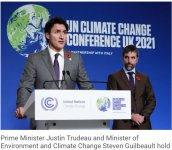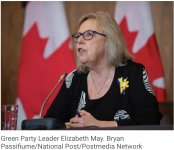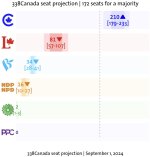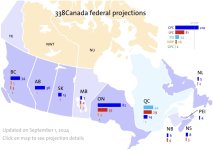Or might want a second term ‘cuz they got elected for the first time in 2021 instead of 2019 and don’t get the Justin/Jagmeet switcheroo election date hanky-panky that slides many into pension eligibility that wouldn’t have earned it otherwise?Not mentioned here is the internal pressure from the rank and file NDP who also hate the tax .
Trudeau’s Newest New Carbon Tax
- Thread starter Ron in Regina
- Start date
You are using an out of date browser. It may not display this or other websites correctly.
You should upgrade or use an alternative browser.
You should upgrade or use an alternative browser.
The MP’s fall under that but their supporters don’t and they write the checks and go to constituency meetings .Or might want a second term ‘cuz they got elected for the first time in 2021 instead of 2019 and don’t get the Justin/Jagmeet switcheroo election date hanky-panky that slides many into pension eligibility that wouldn’t have earned it otherwise?
convections and the like . Why do you think Jagmet is bouncing around like a lacrosse ball ?The MP’s fall under that but their supporters don’t and they write the checks and go to constituency meetings .
Too little too late if the NDP wish to not be the NDP/Liberals to Justin’s Liberal/NDP’ers. They’re connected at the hip.The MP’s fall under that but their supporters don’t and they write the checks and go to constituency meetings .
Conventions be damned. The NDP have been in lockstep with the Liberals since before Putin invaded Ukraine for his three day war. Singh is locked in like two dogs after the rut with Trudeau due to this:convections and the like . Why do you think Jagmet is bouncing around like a lacrosse ball ?

the Great Canadian Pension Coalition Party is taking over Canada's federal government.
The changes to the fixed election date law will all but guarantee the Trudeau Liberals stay in power until October 2025, here is why.
You are correct on both counts . But the caucus are still feeling the heat in their constituency.Too little too late if the NDP wish to not be the NDP/Liberals to Justin’s Liberal/NDP’ers. They’re connected at the hip.
Conventions be damned. The NDP have been in lockstep with the Liberals since before Putin invaded Ukraine for his three day war. Singh is locked in like two dogs after the rut with Trudeau due to this:
You know that whatever comes out’a Jagmeet’s mouth, his NDP/Liberals will back the Liberal/NDP no matter what crazy malarkey comes down the pipe from on high.
the Great Canadian Pension Coalition Party is taking over Canada's federal government.
The changes to the fixed election date law will all but guarantee the Trudeau Liberals stay in power until October 2025, here is why.www.youtube.com
Prime Minister Justin Trudeau recently whipped out the big guns of rhetoric and said the premiers of Alberta, Nova Scotia, New Brunswick, Newfoundland and Labrador, Ontario, Prince Edward Island and Saskatchewan (I think he missed Manitoba?) are “misleading” Canadians and “not telling the truth” about the carbon tax. Also recently, a group of economists circulated a one-sided open letter extolling the virtues of carbon pricing.
Governments face the constant allure of diverting tax revenues to favour one constituency over another. In the case of the carbon tax, Quebec is the big winner here. Atlantic Canada was also recently won by having its home heating oil exempted from carbon pricing (while out in the frosty plains, those using natural gas heating will feel the tax’s pinch).

 apple.news
apple.news
Governments face the constant allure of diverting tax revenues to favour one constituency over another. In the case of the carbon tax, Quebec is the big winner here. Atlantic Canada was also recently won by having its home heating oil exempted from carbon pricing (while out in the frosty plains, those using natural gas heating will feel the tax’s pinch).
GREEN: Powerful players count on corruption of ideal carbon tax — Toronto Sun
Prime Minister Justin Trudeau recently whipped out the big guns of rhetoric and said the premiers of Alberta, Nova Scotia, New Brunswick, Newfoundland and Labrador, Ontario, Prince Edward Island and Saskatchewan are “misleading” Canadians and “not telling the truth” about the carbon tax. Also...
Gas prices spike in N.S. by nearly 10 cents a litre. Here's how that compares with last year — Global News
The price of gasoline jumped by 9.8 cents in the Halifax-area. The price at the pump in Cape Breton, is slightly higher -- at a minimum price 186.9 cents per litre.
Guess those economists want to keep getting their drift from this government so they need to spew the same B.S. It's incredible that anyone would believe this scam!Prime Minister Justin Trudeau recently whipped out the big guns of rhetoric and said the premiers of Alberta, Nova Scotia, New Brunswick, Newfoundland and Labrador, Ontario, Prince Edward Island and Saskatchewan (I think he missed Manitoba?) are “misleading” Canadians and “not telling the truth” about the carbon tax. Also recently, a group of economists circulated a one-sided open letter extolling the virtues of carbon pricing.
Governments face the constant allure of diverting tax revenues to favour one constituency over another. In the case of the carbon tax, Quebec is the big winner here. Atlantic Canada was also recently won by having its home heating oil exempted from carbon pricing (while out in the frosty plains, those using natural gas heating will feel the tax’s pinch).

GREEN: Powerful players count on corruption of ideal carbon tax — Toronto Sun
Prime Minister Justin Trudeau recently whipped out the big guns of rhetoric and said the premiers of Alberta, Nova Scotia, New Brunswick, Newfoundland and Labrador, Ontario, Prince Edward Island and Saskatchewan are “misleading” Canadians and “not telling the truth” about the carbon tax. Also...apple.news
Chickens with their heads cut off run around in circles. In politics, the federal Liberals are starting to exhibit this post-mortem behaviour.
Their electoral chances are as good as dead, and their head, Prime Minister Justin Trudeau, seems only tenuously attached to his party.
Still, they dash around crazily, patching this and launching that, all while sticking to their unpopular policies, ministers and leader.
Environment and Climate Change Minister Steven Guilbeault, the core cabinet fowl who said no new roads should be built in Canada, continues to press his climate extremism.

The result is political fiasco.
Alberta and Saskatchewan have always been bitterly opposed to many measures. But Guilbeault is now losing support from the public, provincial governments that once were at least neutral and, crucially, the powerful climate action lobby.
The disasters are self-inflicted. Trudeau and Guilbeault stuck to the carbon tax even after the policy’s disastrous deflation by the “carve out” for home heating oil, a benefit mainly to Atlantic Canada.
Their faux-tough response — nobody else gets that, dammit! — actually cost farmers a break that had been planned, but suddenly looked like another exemption.
The carbon tax, revealed as a purely political tool, is ripe for axing by a potential new leader like Mark Carney. Even New Democrats have argued that the tax should exit, stage left.

 calgaryherald.com
Now, Guilbeault has introduced amendments to the Impact Assessment Act, allegedly bringing it into line with the Supreme Court ruling that found the law seriously intrudes on powers rightly belonging to the provinces.
calgaryherald.com
Now, Guilbeault has introduced amendments to the Impact Assessment Act, allegedly bringing it into line with the Supreme Court ruling that found the law seriously intrudes on powers rightly belonging to the provinces.
Guilbeault has never acknowledged this was a defeat. He treats the ruling as a simple policy problem rather than a 5-2 thumping by judges not usually known for hostility to federal power grabs.
Alberta was predictably furious about the amendments. Premier Danielle Smith always said Guilbeault would make a gesture and proceed as usual, forcing yet another court challenge.
“When you look at the unconstitutionality of the first draft, you can’t just make tweaks and bring this in line with the Constitution,” says Rebecca Schulz, Alberta’s minister for environment and protected areas.
“That’s really the issue here. Minister Guilbeault still has the ability to involve himself in projects that are within provincial jurisdiction.
“In the end, this piece of legislation remains unconstitutional. We are going to be taking this back to court and I’m confident in our position, because their changes don’t actually address the issues that we’ve raised.”
The trouble is, legal uncertainty causes still more delays in building crucial projects. Ottawa imposed a ban on designating new major projects after the court ruling. It has been in effect for seven months.
The Impact Assessment Agency, the powerful regulatory body that oversees all this, said in a statement: “No decisions to designate projects will be taken. Consideration of any new designation requests will only resume, as appropriate, once amended legislation is in force.”
Most striking is the fury from the climate action lobby toward Guilbeault’s amendments.
“Overall, the bill is a complete federal abdication to address proposed high-carbon projects such as in situ oil mines,” Steven Hazell, a retired environment lawyer and federal regulator told the National Observer, Canada’s best chronicler of climate stories and policy.
Green party Leader Elizabeth May said the government was “erring on the side of stupidity.” May sees the court decision as an opportunity to go further with legislation, not retreat to meet demands of provincial jurisdiction?
She’s the politician who believes the country should be put under virtual martial law to deal with the climate emergency, with all power to Ottawa.

And those people are, more or less, the Liberals’ natural allies.
That’s where Trudeau and his crew have got themselves as they race around, trying to find a murky middle ground on everything from climate action to taxation and Israel’s war against Hamas (no major religious group in Canada now favours the Liberals, according to a new poll from the Angus Reid Institute).
Canadian Muslim majority do support the NDP though, currently, but that’s a different story.

 apple.news
apple.news

Their electoral chances are as good as dead, and their head, Prime Minister Justin Trudeau, seems only tenuously attached to his party.
Still, they dash around crazily, patching this and launching that, all while sticking to their unpopular policies, ministers and leader.
Environment and Climate Change Minister Steven Guilbeault, the core cabinet fowl who said no new roads should be built in Canada, continues to press his climate extremism.

The result is political fiasco.
Alberta and Saskatchewan have always been bitterly opposed to many measures. But Guilbeault is now losing support from the public, provincial governments that once were at least neutral and, crucially, the powerful climate action lobby.
The disasters are self-inflicted. Trudeau and Guilbeault stuck to the carbon tax even after the policy’s disastrous deflation by the “carve out” for home heating oil, a benefit mainly to Atlantic Canada.
Their faux-tough response — nobody else gets that, dammit! — actually cost farmers a break that had been planned, but suddenly looked like another exemption.
The carbon tax, revealed as a purely political tool, is ripe for axing by a potential new leader like Mark Carney. Even New Democrats have argued that the tax should exit, stage left.

Braid: As Trudeau Liberals near-death experience deepens, they race around in vain hunt for allies
The Justin Trudeau Liberals are now alienating nearly everyone, including Canada's powerful climate lobby, writes columnist Don Braid.
Guilbeault has never acknowledged this was a defeat. He treats the ruling as a simple policy problem rather than a 5-2 thumping by judges not usually known for hostility to federal power grabs.
Alberta was predictably furious about the amendments. Premier Danielle Smith always said Guilbeault would make a gesture and proceed as usual, forcing yet another court challenge.
“When you look at the unconstitutionality of the first draft, you can’t just make tweaks and bring this in line with the Constitution,” says Rebecca Schulz, Alberta’s minister for environment and protected areas.
“That’s really the issue here. Minister Guilbeault still has the ability to involve himself in projects that are within provincial jurisdiction.
“In the end, this piece of legislation remains unconstitutional. We are going to be taking this back to court and I’m confident in our position, because their changes don’t actually address the issues that we’ve raised.”
The trouble is, legal uncertainty causes still more delays in building crucial projects. Ottawa imposed a ban on designating new major projects after the court ruling. It has been in effect for seven months.
The Impact Assessment Agency, the powerful regulatory body that oversees all this, said in a statement: “No decisions to designate projects will be taken. Consideration of any new designation requests will only resume, as appropriate, once amended legislation is in force.”
Most striking is the fury from the climate action lobby toward Guilbeault’s amendments.
“Overall, the bill is a complete federal abdication to address proposed high-carbon projects such as in situ oil mines,” Steven Hazell, a retired environment lawyer and federal regulator told the National Observer, Canada’s best chronicler of climate stories and policy.
Green party Leader Elizabeth May said the government was “erring on the side of stupidity.” May sees the court decision as an opportunity to go further with legislation, not retreat to meet demands of provincial jurisdiction?
She’s the politician who believes the country should be put under virtual martial law to deal with the climate emergency, with all power to Ottawa.

And those people are, more or less, the Liberals’ natural allies.
That’s where Trudeau and his crew have got themselves as they race around, trying to find a murky middle ground on everything from climate action to taxation and Israel’s war against Hamas (no major religious group in Canada now favours the Liberals, according to a new poll from the Angus Reid Institute).
Canadian Muslim majority do support the NDP though, currently, but that’s a different story.
Cost of Canada's COP28 climate conference attendance, featuring rapper, hits $3M — National Post
The new numbers are nearly double what government documents reported in March

Soooo…. Back about five months ago, Poilievre & the Conservative Party tried to initiate (on a confidence vote) a “Carbon Tax” election…& that was voted down by the Liberals, Bloc, & all (both) Green MP’s.
Here we are in Early September 2024, & parliament is still out on their Summer Break, & when they come back, they still don’t know what the schedule is going to be for dates in Parliament as to who gets to do what when, etc…but…
…but…Poilievre and the Conservative Party will again (fairly certain) initiate a confidence motion to have a “Carbon Tax” election. Today happens to be the day that Jagmeet Singh & his NDP/Liberals Walked away from (supposedly) their non-coalition coalition that’s definitely not a coalition-type coalition supply & confidence agreement because they are so disappointed in the Liberal/NDP Party that they could only support them no matter what for 2 years & 5 months & a few weeks but no more ‘cuz stuff (!) & things!!
Will it be a repeat of the Liberal/NDP and NDP/Liberal and Bloc and all (both) Green MP’s voting with each other in lockstep against this?

Justin Trudeau & the Liberals are so toxically scandal ridden than anyone that enters their orbit seems to crash & burn from the stench…from their own MP’s (especially the cabinet members) to WE & SCN-Lavatory & nobody (except those named Trudeau) are exempt from being thrown under the Liberal/NDP bus.

I can see the NDP/Liberals & Liberal/NDP & of course all both of the Greens to be against this…but what about the Bloc? This might be their opportunity to scoop many ridings in Quebec that they don’t already carry…(?)…& not be associated with the stench of Liberal/NDP.


Justin Trudeau & the Liberals are so toxically scandal ridden than anyone that enters their orbit seems to crash & burn from the stench…from their own MP’s (especially the cabinet members) to WE & SCN-Lavatory & nobody (except those named Trudeau) are exempt from being thrown under the Liberal/NDP bus.

I can see the NDP/Liberals & Liberal/NDP & of course all both of the Greens to be against this…but what about the Bloc? This might be their opportunity to scoop many ridings in Quebec that they don’t already carry…(?)…& not be associated with the stench of Liberal/NDP.

Be c sad if the official opposition is once again the Bloc . But it will once again show Canada to be four or five regions with different aspirations all pulling in opposing direction . Sooner or later Canada will implode , the sooner the better IMHO .Soooo…. Back about five months ago, Poilievre & the Conservative Party tried to initiate (on a confidence vote) a “Carbon Tax” election…& that was voted down by the Liberals, Bloc, & all (both) Green MP’s.
Here we are in Early September 2024, & parliament is still out on their Summer Break, & when they come back, they still don’t know what the schedule is going to be for dates in Parliament as to who gets to do what when, etc…but…
…but…Poilievre and the Conservative Party will again (fairly certain) initiate a confidence motion to have a “Carbon Tax” election. Today happens to be the day that Jagmeet Singh & his NDP/Liberals Walked away from (supposedly) their non-coalition coalition that’s definitely not a coalition-type coalition supply & confidence agreement because they are so disappointed in the Liberal/NDP Party that they could only support them no matter what for 2 years & 5 months & a few weeks but no more ‘cuz stuff (!) & things!!
Will it be a repeat of the Liberal/NDP and NDP/Liberal and Bloc and all (both) Green MP’s voting with each other in lockstep against this?
View attachment 24487
Justin Trudeau & the Liberals are so toxically scandal ridden than anyone that enters their orbit seems to crash & burn from the stench…from their own MP’s (especially the cabinet members) to WE & SCN-Lavatory & nobody (except those named Trudeau) are exempt from being thrown under the Liberal/NDP bus.
View attachment 24489
I can see the NDP/Liberals & Liberal/NDP & of course all both of the Greens to be against this…but what about the Bloc? This might be their opportunity to scoop many ridings in Quebec that they don’t already carry…(?)…& not be associated with the stench of Liberal/NDP.
View attachment 24488
This is the beginning of the end for a Liberal Wet Dream run amok. I have traveled across this country to see my grandkids, which has been fantastic, but what hasn't been awesome is the first-hand look at the Liberal policies and the destruction they have caused. The two most glaring issues are drug addiction and homelessness. By the way, "Fuck you and the word unhoused." They are fucking homeless, and changing the word is a pretty fucking lame way of addressing the growing homelessness in this country. What? Do you think they'll feel better about themselves? And while we're at it, they aren't drug addicted and homeless because of big pharma; it's because the Federal government thought it would be a good idea to give drug addicts free drugs and free reign to do it wherever they please. Including setting up tent cities where the dealers roam. Like a lower-end ghetto where people get murdered and raped all in the name of giving dignity to the unhoused. Fuck me!
Since 2015, drug addiction has exploded in Canada thanks to Trudeau and Singh and anyone else who endorsed poisoning the public. Homelessness has exploded because of the drug policies, but also the idiocy of Liberal municipalities who started condoning this shit. I saw a kid the other day who looked like an extra from I AM LEGEND. He was like a statue on a sidewalk; his skin had a mixture of sores and whatever else he picked up on the street, and honestly, folks, whatever dimension he was in, it wasn't this one. He was the walking dead, literally.
These tent cities did not rise out of high rent or big pharma. They were born from Fentanyl, Crack, Meth, and a government complicit with killing people by slow death. If you wanted to do a service to this country and these people, the first thing you should do is find out who is dealing and supplying the poison and put a bullet in their skull. That's how bad this shit is. That's how badly they have harmed 100s of thousands of families in Canada who are also victims of the drug trade and the Liberal Czars who created this clusterfuck.
The young lady below is putting on makeup before an interview because of the damage done to her complexion caused by Fentanyl.
I hope Pollievre pulls the plug on these moron-wokers when he gets in.
They have fucked up Canada beyond all recognition.

Since 2015, drug addiction has exploded in Canada thanks to Trudeau and Singh and anyone else who endorsed poisoning the public. Homelessness has exploded because of the drug policies, but also the idiocy of Liberal municipalities who started condoning this shit. I saw a kid the other day who looked like an extra from I AM LEGEND. He was like a statue on a sidewalk; his skin had a mixture of sores and whatever else he picked up on the street, and honestly, folks, whatever dimension he was in, it wasn't this one. He was the walking dead, literally.
These tent cities did not rise out of high rent or big pharma. They were born from Fentanyl, Crack, Meth, and a government complicit with killing people by slow death. If you wanted to do a service to this country and these people, the first thing you should do is find out who is dealing and supplying the poison and put a bullet in their skull. That's how bad this shit is. That's how badly they have harmed 100s of thousands of families in Canada who are also victims of the drug trade and the Liberal Czars who created this clusterfuck.
The young lady below is putting on makeup before an interview because of the damage done to her complexion caused by Fentanyl.
I hope Pollievre pulls the plug on these moron-wokers when he gets in.
They have fucked up Canada beyond all recognition.

Last edited:
This is the beginning of the end for a Liberal Wet Dream run amok. I have traveled across this country to see my grandkids, which has been fantastic, but what hasn't been awesome is the first-hand look at the Liberal policies and the destruction they have caused. The two most glaring issues are drug addiction and homelessness. By the way. Fuck you and the word unhoused. They are fucking homeless, and changing the word is pretty fucking lame. Also, they aren't drug addicted and homeless because of big pharma; it's because the Federal government thought it would be a good idea to give drug addicts free drugs and free reign to do it wherever they please. Including setting up tent cities where the dealers roam. Like a lower-end ghetto where people get murdered and raped all in the name of giving dignity to the unhoused. Fuck me!
Since 2015, drug addiction has exploded in Canada thanks to Trudeau and Singh and anyone else who endorsed poisoning the public. Homelessness has exploded because of the drug policies, but also the idiocy of Liberal municipalities who started condoning this shit. I saw a kid the other day who looked like an extra from I AM LEGEND. He was like a statue on a sidewalk; his skin had a mixture of sores and whatever else he picked up on the street, and honestly, folks, whatever dimension he was in, it wasn't this one. He was the walking dead, literally.
These tent cities did not rise out of high rent or big pharma. They were born from Fentanyl, Crack, Meth, and a government complicit with killing people by slow death. If you wanted to do a service to this country and these people, the first thing you should do is find out who is dealing and supplying the poison and put a bullet in their skull. That's how bad this shit is. That's how badly they have harmed 100s of thousands of families in Canada who are also victims of the drug trade and the Liberal Czars who created this clusterfuck.
The young lady below is putting on makeup before an interview because of the damage done to her complexion caused by Fentanyl.
I hope Pollievre pulls the plug on these moron-wokers when he gets in.
They have fucked up Canada beyond all recognition.
View attachment 24495
You think PP will give a shit if he's in office?
You're as delusional as those who think homelessness is 'nothing to worry 'bout'.
He's been a politician all his life, he should know by now if he wanted to look like he gave even the tiniest bit of a shit, he should be talking 'bout it and telling people what he wants to do about it, not just saying "Singh and Trudeau fucked it up".
Outside of being a murderer, what would YOU suggest for solutions to homelessness? (and while a lot of it is drugs, yes, there ARE those who are homeless due to rising housing costs/rents, their status as GLBTQIA+ and other stupid societal reasons).
So. . . what specific measures or legislation do you want to see? Has Pete committed to introducing any of these? Or is he just a steaming pile of horse shit wrapped up in a stupid hat, cheerleading the bitch-fest and pointing out people for you to hate?This is the beginning of the end for a Liberal Wet Dream run amok. I have traveled across this country to see my grandkids, which has been fantastic, but what hasn't been awesome is the first-hand look at the Liberal policies and the destruction they have caused. The two most glaring issues are drug addiction and homelessness. By the way, "Fuck you and the word unhoused." They are fucking homeless, and changing the word is a pretty fucking lame way of addressing the growing homelessness in this country. What? Do you think they'll feel better about themselves? And while we're at it, they aren't drug addicted and homeless because of big pharma; it's because the Federal government thought it would be a good idea to give drug addicts free drugs and free reign to do it wherever they please. Including setting up tent cities where the dealers roam. Like a lower-end ghetto where people get murdered and raped all in the name of giving dignity to the unhoused. Fuck me!
Since 2015, drug addiction has exploded in Canada thanks to Trudeau and Singh and anyone else who endorsed poisoning the public. Homelessness has exploded because of the drug policies, but also the idiocy of Liberal municipalities who started condoning this shit. I saw a kid the other day who looked like an extra from I AM LEGEND. He was like a statue on a sidewalk; his skin had a mixture of sores and whatever else he picked up on the street, and honestly, folks, whatever dimension he was in, it wasn't this one. He was the walking dead, literally.
These tent cities did not rise out of high rent or big pharma. They were born from Fentanyl, Crack, Meth, and a government complicit with killing people by slow death. If you wanted to do a service to this country and these people, the first thing you should do is find out who is dealing and supplying the poison and put a bullet in their skull. That's how bad this shit is. That's how badly they have harmed 100s of thousands of families in Canada who are also victims of the drug trade and the Liberal Czars who created this clusterfuck.
The young lady below is putting on makeup before an interview because of the damage done to her complexion caused by Fentanyl.
I hope Pollievre pulls the plug on these moron-wokers when he gets in.
They have fucked up Canada beyond all recognition.
View attachment 24495
He's going to get rid of a lot of stupid policies.You think PP will give a shit if he's in office?
Where did I say homelessness is nothing to worry about?You're as delusional as those who think homelessness is 'nothing to worry 'bout'.
He didn't create this mess. Trudeau did, along with Singh in the last few years.He's been a politician all his life, he should know by now if he wanted to look like he gave even the tiniest bit of a shit, he should be talking 'bout it and telling people what he wants to do about it, not just saying "Singh and Trudeau fucked it up".
My family went through almost a decade of drug addiction, so I think I can speak with a bit of authority on this issue. The only thing harder than being an addict is being the parent of an addict. We need extreme measures; I am not seriously advocating going into the streets and gunning down dealers. Although, it would be very effective. Maybe like when they do a cull in hunting. One scumbag=$15.00. LOLOutside of being a murderer, what would YOU suggest for solutions to homelessness? (and while a lot of it is drugs, yes, there ARE those who are homeless due to rising housing costs/rents, their status as GLBTQIA+ and other stupid societal reasons).
Seriously, the revolving bail door and free drugs for dealers to sell to addicts don't seem to be working. I think mandatory minimums might help, but Liberals think differently.
Last edited:
Safe Injection Stopped.So. . . what specific measures or legislation do you want to see? Has Pete committed to introducing any of these? Or is he just a steaming pile of horse shit wrapped up in a stupid hat, cheerleading the bitch-fest and pointing out people for you to hate?
Funding for Rehabilitation that doesn't have a six-week waiting list.
Mandatory minimums for trafficking drugs.
Mandatory minimums for murder.
No bail for violent offenders.
We need a path to recovery, not a ghetto built for consumption.
Agree.Safe Injection Stopped.
Funding for Rehabilitation and Rehabilitation that doesn't have a six-week waiting list.
Mandatory minimums for trafficking drugs.
We need a path to recovery, not a ghetto built for consumption.
Agree.
Agree.
Are these things you want to see, or are they things Pete has committed to? Or both.
Philosophically, I don't think the government has any business telling you what to inhale, ingest, or inject. And attempting to make hard drugs "less dangerous" is just plain stupid. But the government does have the power to regulate or outright ban (with criminal penalties) producing, selling, or otherwise profiting from dangerous goods.
I'd put at least half of the total prevention/treatment budget into penal expansion. Of course, the penal system also needs a ground-up re-think, but that's another topic. Harsh sentences, no parole, and while you're inside, you work or you don't eat.
Our penal system puts serial killers in medium security and female child murderers in healing lodges when the people aren't looking.Agree.
Agree.
Agree.
Are these things you want to see, or are they things Pete has committed to? Or both.
Philosophically, I don't think the government has any business telling you what to inhale, ingest, or inject. And attempting to make hard drugs "less dangerous" is just plain stupid. But the government does have the power to regulate or outright ban (with criminal penalties) producing, selling, or otherwise profiting from dangerous goods.
I'd put at least half of the total prevention/treatment budget into penal expansion. Of course, the penal system also needs a ground-up re-think, but that's another topic. Harsh sentences, no parole, and while you're inside, you work or you don't eat.
So fix that shit. What's Pete's plan, if any?Our penal system puts serial killers in medium security and female child murderers in healing lodges when the people aren't looking.
Don't get me wrong, I support (for what it's worth, that and $CA 4.00'll get you a (small) cup of coffee and one Timbit), Pete, simply on the basis of "We've seen what True Dope can and will do, and we're less than wowed." But I'd feel better if he was more than "not True Dope."